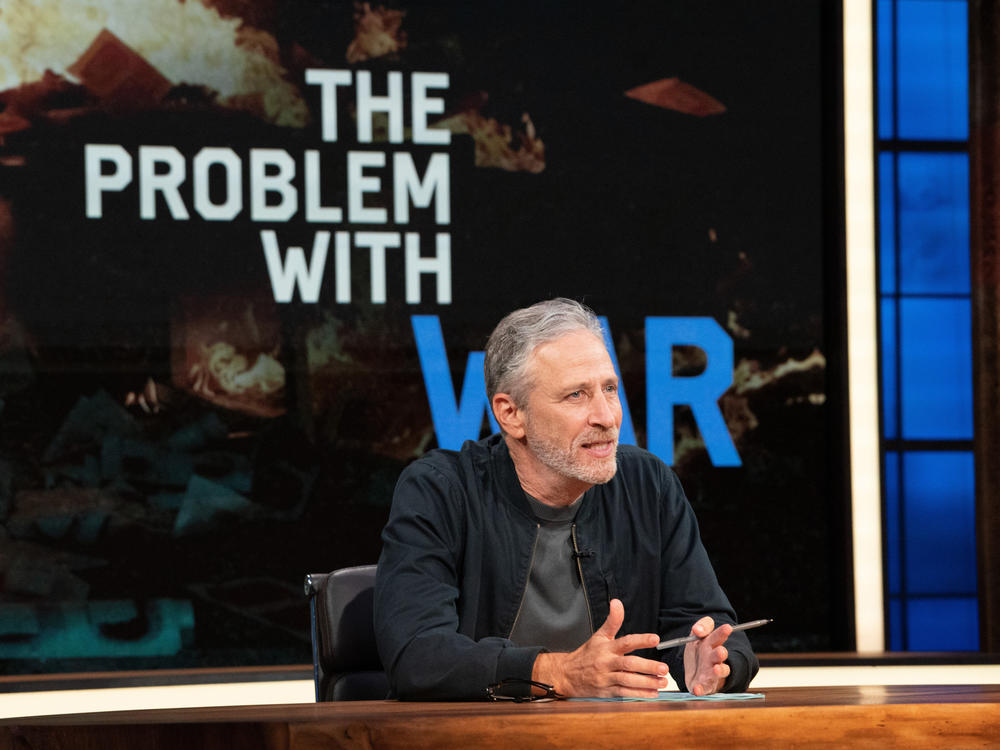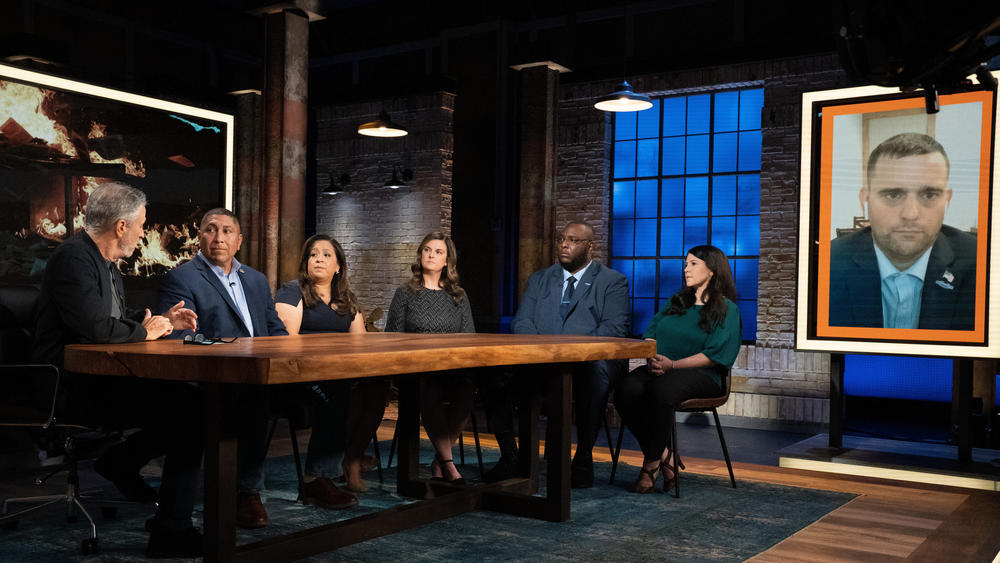Section Branding
Header Content
Apple TV+'s 'The Problem With Jon Stewart' Struggles To Find Its Comedic Voice
Primary Content
As a longtime fan of The Daily Show, I'll say this: Any time former host Jon Stewart pops up on TV to joke about society's problems is a good day.
But his new Apple TV+ talk show, The Problem with Jon Stewart, violates one of the primary rules of television: Don't choose a title that makes it easy for critics to criticize.
As in, The Problem with Jon Stewart is that it's too much like The Daily Show. Or The Problem with Jon Stewart is that its host lectures the audience too much. Or this killer: The Problem with Jon Stewart is that it isn't funny enough.
In truth, The Problem with Jon Stewart hits a groove in its second episode, which minimizes some of the issues I poked fun at in the earlier paragraph. And the show's focus on important subjects, explored with passion and compassion, makes for compelling viewing.
Still, much in the first two installments — Apple TV+ gave critics an early look at those episodes — feels like a stitched-together pastiche of items from Stewart's old show and a few other programs he inspired.
Each episode centers on a single topic, which Stewart outlines in a series of jokes at the start – kinda like his old Daily Show monologues or what John Oliver now does on HBO. Midway through both episodes, he conducts discussions with a roundtable of people, similar to what Bill Maher does. And each episode's segments are separated by brief, pre-recorded bits, which Oliver also does, sometimes.
The show's first episode is also a bit awkward because of its gravity. Stewart explores health problems many military veterans believe resulted from exposure to toxins released when garbage and waste were burned at or near military bases where they served overseas.
Waste items can include everything from old food and uniforms to ammunition, nuclear waste and human feces; burning them with jet fuel produces clouds of smoke, which soldiers breathe for extended periods. And when health problems surface, sometimes years after they have left service, the soldiers can't prove to the government that their cancer or lung ailments resulted from the burn pits.
"The [Veterans Administration's] motto is, delay, deny, hope you die," one veteran says in a clip played on the show.
It's a subject that's tough to joke about, but one that Stewart has pushed to resolve for years as an activist. On his Apple TV+ show, Stewart's best moments come when he speaks to a roundtable of veterans and their spouses about the mountain of bureaucracy they confront while trying to get help paying medical bills which have bankrupted them.
Stewart's show also tries to offer solutions, so he zeroes in on their hope: That the VA accepts these ailments were caused by their service, pays for top-notch treatments and begins warning veterans of the health problems they might face.
"At this point, it's too late for me...I have accepted that," says Wesley Black, a retired National Guard veteran diagnosed with stage-four colon cancer. "If I can prevent just one family from going through what I'm going through right now, I can kneel before my maker and say 'I did a lot of bad s--- in my life, but I did one good thing. I advocated for those that didn't know.'"
The show's second episode flows a bit better, focused on the rise of authoritarianism around the world and the problems which arise when Americans insist on personal freedom over sacrificing for the common public good – refusing to wear masks or take a vaccine in a deadly pandemic, for example.
"I thought we all agreed just a second ago that freedom isn't free and patriots sacrifice to preserve that freedom," Stewart says. "If every sacrifice for the group is viewed as oppression, then we lose the ability to preserve your individual freedom."
One inspired pre-taped bit features Black-ish star Jenifer Lewis as an "oppression mentor," speaking to those who think mask mandates are oppression. "Black people have been dealing with oppression for 400 years," she says powerfully. "They picked cotton. You just have to wear it."
Stewart's roundtable, featuring activists from countries struggling with authoritarianism — Egypt, Venezuela and the Philippines — was both enlightening and chilling. Maria Ressa, a Filipino-American journalist facing jail amid concerns President Rodrigo Duterte is cracking down on the press, said misinformation spread on social media can discourage voters and enable dictators.
Bassem Youssef, a political satirist who fled Egypt when his work became unpopular with the country's military, noted "more often than not, people who call for freedom they actually call for a tailor-made version that works for them, with a total disregard for other people's freedom."
The message was simple: What happened to them just might happen here.
Overall, The Problem with Jon Stewart tackles bigger issues and larger ideas than Stewart often did over 16 years on The Daily Show, though the host seems most comfortable when the program settles into something resembling his former gig. There is still a sense that the show is finding itself, so things can get a little preachy; it only drops a new episode every two weeks, which gives less time to improve (though there is also a weekly podcast).
Even in a TV world where lots of other shows are covering similar ground, it's a pleasure to see an old master like Stewart saddle up once again, trying hard to make an audience care about injustice and – just maybe – do something about it.
But his biggest problem right now is finding a new way to communicate which doesn't feel like a nod to his old life.
Copyright 2021 NPR. To see more, visit https://www.npr.org.


